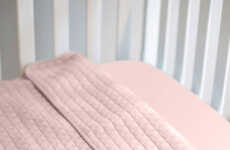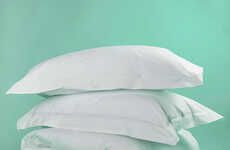
Linen Reform is Revolutionizing the Home Textile Market
Grace Mahas — January 19, 2024 — Art & Design
References: settingmind
Linen Reform, founded by Nicole Last, is revolutionizing the home textile market with its commitment to sustainability, ethical practices, and high-quality craftsmanship. The brand stands out for using GOTS-certified organic and OEKO-TEX® certified materials, ensuring eco-friendly production and safety from harmful substances. Linen Reform is dedicated to achieving 100% GOTS certification for all its products, underlining its commitment to environmental sustainability.
The brand's ethical approach extends to manufacturing, partnering exclusively with FAIRTRADE-certified factories to ensure fair wages and ethical working conditions. This commitment is evident in their factory partnerships across India, Turkey, and Portugal.
In addition to sustainable materials, Linen Reform focuses on minimizing environmental impact through eco-friendly packaging and electric vehicle deliveries. The brand also emphasizes the longevity of its products, crafting durable, heirloom-quality linens. Linen Reform's holistic approach to sustainability combines luxury with a deep commitment to environmental and social responsibility.
The brand's ethical approach extends to manufacturing, partnering exclusively with FAIRTRADE-certified factories to ensure fair wages and ethical working conditions. This commitment is evident in their factory partnerships across India, Turkey, and Portugal.
In addition to sustainable materials, Linen Reform focuses on minimizing environmental impact through eco-friendly packaging and electric vehicle deliveries. The brand also emphasizes the longevity of its products, crafting durable, heirloom-quality linens. Linen Reform's holistic approach to sustainability combines luxury with a deep commitment to environmental and social responsibility.
Trend Themes
1. Sustainable Materials - The use of GOTS-certified organic and OEKO-TEX® certified materials in home textiles presents an opportunity for disruptive innovation in the industry.
2. Ethical Manufacturing - Partnering exclusively with FAIRTRADE-certified factories creates the potential for disruptive innovation in the manufacturing sector of the home textile industry.
3. Environmental Impact Reduction - Minimizing environmental impact through eco-friendly packaging and electric vehicle deliveries has potential for disruptive innovation in the logistics and transportation sectors.
Industry Implications
1. Home Textiles - The home textiles industry can explore disruptive innovation opportunities by adopting sustainable materials like GOTS-certified organic and OEKO-TEX® certified materials.
2. Manufacturing - The manufacturing industry can embrace disruptive innovation by partnering with FAIRTRADE-certified factories to ensure fair wages and ethical working conditions.
3. Logistics and Transportation - The logistics and transportation industry can discover disruptive innovation opportunities by implementing eco-friendly packaging and electric vehicle deliveries to reduce environmental impact.
6.7
Score
Popularity
Activity
Freshness























